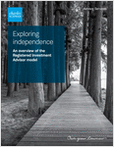Given its fundamental importance to the lives and aspirations of most working Americans, the topic of optimal retirement planning rightly receives a lot of attention from academic and industry researchers, and that was clearly in the case once again in 2023.
As various experts have told ThinkAdvisor, a groundswell of innovative retirement research was released throughout the year, featuring both new and well-known authors tackling some of the biggest planning questions facing those leaving the workforce today: How can pension-less investors effectively balance market risk and longevity risk? What are the best approaches to mitigating taxes in retirement? What role might guaranteed annuities play? Are rigid or flexible spending approaches superior?
This broad focus on retirement issues is reflected in the success of researchers recognized by the CFP Board Center for Financial Planning, which announced its 2023 Best Paper Awards earlier in December during its seventh annual Academic Research Colloquium. Many of the papers accepted for presentation at the colloquium this year touch directly on these and other timely retirement questions.
In the words of the Certified Financial Planner Board of Standards’ CEO Kevin Keller, this year’s contributors and award winners produced some “outstanding papers,” and he thanked both emerging scholars and lifelong contributors in the financial services field for their innovative work.
Here are seven retirement-focused papers recognized by the CFP Board for their contributions to the retirement planning profession in 2023.
1. Economic Security of Older Adults after the Death of a Partner: Evidence From Credit Data
From a quintet of researchers from Ohio State University, this paper starts from the premise that the death of a partner has long been recognized as a threat to the economic security of older adults.
Despite this, the authors say, little is known about changes in credit and debt for surviving older adults. Further, the financial implications of a partner’s death may differ for unexpected deaths, such as those during the COVID-19 pandemic.
The authors thus examine the relationships between the death of a partner and the economic security of surviving older adults in the pre-pandemic and pandemic periods, spanning 2017 to 2021. They do so utilizing a “unique panel dataset” that combines individual-level administrative wage data and detailed financial information.
The authors find a significant increase in missed debt payments and persistent decline in credit scores following the death of a partner, especially among vulnerable older adults.
2. Retirement Expectations vs. Reality: Factors That Impact Retirement Decisions
Among the authors of this analysis are Zhikun Liu, of MissionSquare Retirement, and David Blanchett, of PGIM.
The authors use a dataset consisting of results from Prudential’s annual financial wellness survey and the University of Michigan Health and Retirement Study. Their work demonstrates that, although there is generally a natural upward trend for older Americans to progressively delay their expected retirement, this trend has no statistically significant relationship with the COVID-19 pandemic.
According to the authors, the distribution of older Americans’ expected retirement ages is “bimodal,” often centered around two Social Security Benefit claiming ages — the early retirement age and full retirement age.
The authors further show that Americans’ actual retirement ages are more likely to follow a left-skewed (retire earlier) distribution. They also analyze the most significant factors that influence retirement decisions relative to expectations, including health status, wealth status, mortality expectations and more.
3. Measures and Drivers of Financial Well-Being
This paper was put together by two researchers at Colorado State University, and it seeks to investigate the “drivers through which individuals attain financial well-being across its different dimensions,” including subjective retirement preparedness.
As the authors emphasize, data shows financial planners who aim to improve their clients’ sense of financial well-being need a nuanced understanding of factors contributing to these measures.
The authors find individual risk-discount tendencies, risk preferences and financial self-confidence consistently contribute to different indicators of financial well-being. In particular, they find significant evidence that both the risk-discount rate and self-confidence in financial decision-making have strong impacts on the various indicators of financial well-being, including the sense of retirement readiness.












 Copyright © 2024 ALM Global, LLC. All Rights Reserved.
Copyright © 2024 ALM Global, LLC. All Rights Reserved.